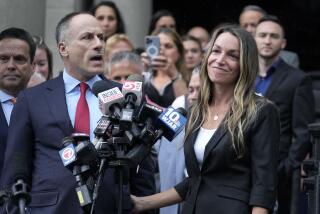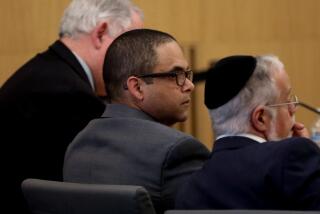3rd Jury to Consider Death Sentence for Killer
- Share via
SANTA ANA — A judge granted a new penalty trial Thursday for convicted triple murderer Edward Charles III, citing misconduct by a juror who sought spiritual advice while deliberating whether the Fullerton mechanic should die for his crimes.
The ruling means a third Orange County jury will weigh a possible death sentence for Charles, who killed his parents and younger brother, then tried to get his grandfather to take the rap.
Superior Court Judge Everett W. Dickey said he wanted to keep the death penalty verdict against 24-year-old Charles but found that a juror’s consultation with a church member undermined the trial’s integrity.
“The defendant is entitled to a fair trial on that issue and a new penalty decision by 12, not 11, jurors who have not sought inspiration from a nonjuror,” Dickey said. “More important, the defendant is also entitled to the opinion of 12, not 13, people on the death penalty.”
Charles faces either the death penalty or life in prison with no parole for his conviction on charges that he killed his parents, Edward and Dolores Charles, and his brother, Danny. The judge’s ruling does not affect the murder conviction, only the potential sentence.
A first jury found Charles guilty of the slayings, but deadlocked 11-to-1 in favor of recommending a death sentence.
In April, a second jury recommended that Charles be executed, saying the horrors of the family’s 1994 slaying outweighed appeals by surviving relatives to spare the young man’s life.
Defense lawyers sought a new penalty trial when they learned a juror on the second panel consulted a church member during deliberations about whether Christians should be involved in death penalty decisions.
Juror Robert Sumarsono testified he “needed inspiration” when he consulted the church member, who directed him to Old Testament scriptures. Sumarsono, one of two undecided jurors at the time, said he soon after changed his vote to death. The juror said he did not discuss the case with the church member, or even say he was serving on a jury.
Dickey said the juror’s actions clearly violated court instructions against consulting outside sources during trial, but the more difficult question was deciding if the consultation legally prejudiced the verdict.
Dickey said he could not be sure the verdict was free of prejudice without knowing every word the juror and church member exchanged.
The judge and attorneys said their legal research failed to turn up any court decisions involving similar situations in which jurors sought spiritual advice during death penalty deliberations.
Deputy Dist. Atty. David Brent, who contended the juror’s actions did not prejudice the verdict, said prosecutors will review the judge’s ruling for a possible appeal.
Brent said his office will seek the death penalty against Charles for a third time, rather than opt for an automatic prison sentence of life without parole.
“Twenty-three of 24 jurors have decided this guy deserves death,” Brent said.
“For us to retry it takes three days of testimony,” he said. “It’s not like it’s a big expense or a big deal.”
The prosecutor has said Charles, a college dropout who aspired to become a boxer, was driven by hate and jealousy when he bludgeoned and stabbed his father and brother, and strangled his mother.
Charles has maintained he is innocent.
His lawyers argued during the two penalty trials that the killings were totally out of his character and life in prison would be a harsh enough sentence for someone who had never been in trouble with the law before.
Edward, Dolores and Danny Charles were killed Nov. 6, 1994, after a Sunday pasta dinner in the family home in Fullerton’s Sunny Hills area. The parents’ nude bodies were found the next night in a car ablaze at a La Mirada school. Danny Charles, 19, had been stuffed in the trunk.
As part of a cover-up plan, Charles tried to shift blame for the killings to his 74-year-old grandfather, who lived with the family and slept through the killings, according to court testimony.
The third penalty retrial is not expected to start until early 1997, and Charles will be represented by new lawyers.
Deputy Public Defenders Ronald Klar and Mark Davis declared a conflict Thursday and said they could no longer represent Charles. They declined to say why they wanted off the case.
The public defenders nearly declared a conflict before the second penalty trial when the prosecutor considered introducing allegations that Charles plotted a courthouse escape by taking a member of his defense team hostage.
Brent decided against using the allegation when the defense lawyers insisted they would have to be removed from the case, causing a lengthy delay.
The defense lawyers said a witness had told them Charles was only joking, and the two said they never feared for their safety.
In court Thursday, Brent offered again to hold back from using the allegation during the third trial, but Klar replied, “There’s a lot more to it.” Klar did not elaborate.
Dickey earlier Thursday denied a request by Charles to have new lawyers appointed after the defendant alleged he had been given incompetent representation by the public defender’s office.
The judge said both lawyers from the office represented Charles “competently and diligently under difficult circumstances. The evidence of his guilt to the crimes charged is overwhelming.”
More to Read
Sign up for Essential California
The most important California stories and recommendations in your inbox every morning.
You may occasionally receive promotional content from the Los Angeles Times.










